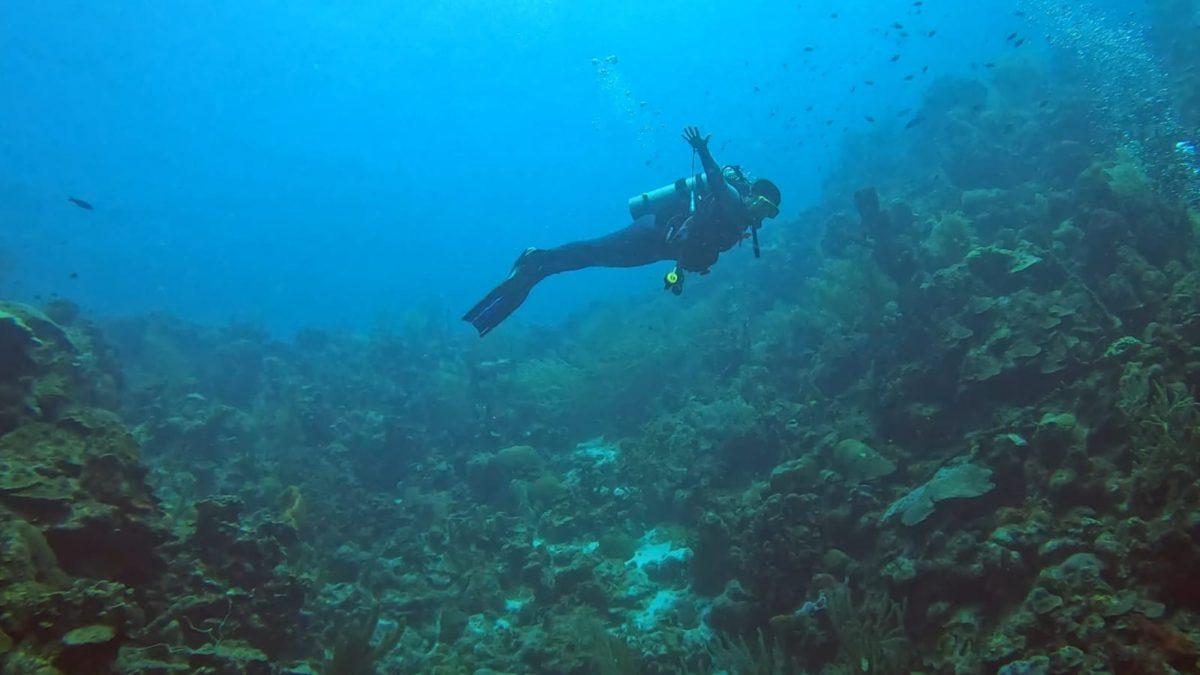With all the urgent discussion surrounding saving the Earth, what lies beneath is somewhat forgotten. Considering three-quarters of our world is composed of water, one may wonder why only 5% of the planet’s oceans have been charted so far. With the growing popularity of scuba diving in the last few decades, the rare opportunity to delve safely and enjoyably into the vast oceanic environment is far more accessible and affordable nowadays than one might imagine.
As a scuba diver of over five years myself, I recently received an additional advanced scuba license in the Dutch Antillean island of Bonaire. I originally completed my open-water training in Bonaire, following a summer course in NYC, where I live. There are several reasons why I love diving along the turquoise coastline of Bonaire, a national marine park since the late ‘70s.
Primarily, the accessibility from the shore as opposed to boat diving saves money and allows for a gradual descent. The year-round warm temperature enhances the experience for beginner divers, and the almost 400 fish species that inhabit the magnificent coral reef provide for an exciting aquatic excursion and an extraordinary photo opportunity. These are only some of the many reasons why I love scuba diving and hope to encourage my peers to try their hand at the same.
Hence, I was pleasantly surprised to discover NC State students can achieve their National Association of Underwater Instructors (NAUI) scuba certification right on campus and begin a lifelong passion of their own. Students can choose between three different courses, spanning fifteen weeks and offered both in the fall and spring semesters. All three courses count for the health and fitness GEP requirement: HESA 226: Skin & Scuba Diving I, HESA 227: Skin & Scuba Diving II and HESA 229: Scuba Leadership (with optional certification).
Matthew Rever, dive instructor at NC State for the last 21 years, said HESA 226 helps develop basic skills, even for students with little to no experience, or those who might be certified prior to taking the class. The entry class enables participants to become safer, more confident, and proficient divers, granting them a solid foundation for the necessary skills during emergencies and “what if” situations.
On the other hand, HESA 227, which was originally structured as a rescue-intensive class, has evolved to incorporate a more well-rounded and advanced approach to diving, including simulating situations under duress. According to Rever, students execute more intensive rescue sequences, post-accident care, and oxygen administration. They also utilize equipment like full face masks with wireless communication, and night dives. Lastly, the scuba leadership class provides students with Dive Master certifications, enabling its graduates to return to the class as a community volunteer to assist with teaching and equipment assembly.
One such community volunteer, NC State alumni Tal Sabas, fell in love with the scuba program and their mission. Despite the inevitable challenges that arose when his scuba course moved online, Sabas finished his leadership track and spoke highly of the scuba program at NC State, which is known across the diving industry for its rigor and expertise.
“Coach Rever instilled these traits in you that can be applied to not only scuba, but everything in your life,” Sabas said. “I was hooked right from the start, not only did I like scuba as a sport, but specifically enjoyed pursuing it at State, where they try to push mental fortitude. The scuba program motivated me to do things that I didn’t think I could.”
Sabas now applies these critical problem-solving techniques in his current job working with software, where things often don’t function as they should and require improvisation, logistics and patience.
Rever encourages his students to value the process over the product; the steps to the finish line are more important than the actual finish line.
Beyond life lessons and enhancing one’s environmental perspective, scuba diving remains one of the most fascinating experiences to embark upon.
With an ever-changing scenery and a personal window into the world’s most diverse ecosystem, scuba reigns as the most thrilling adventure to consider for your next vacation. And did I fail to mention scuba diving is the ultimate social distancing activity? The ocean never gets too crowded. Now more than ever, take a dive.















